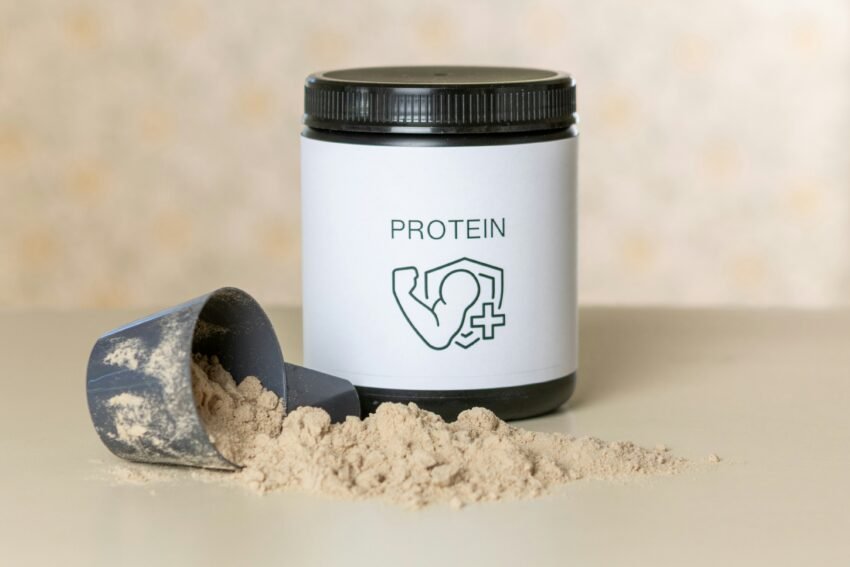Essential Sports Supplements to Boost Health and Performance

Ever wondered how athletes seem to defy the limits of endurance and strength? While dedication and training are key, sports supplements can play a vital role in their success. These powerful allies don’t just boost performance on the field; they also improve overall health. Whether you’re a seasoned athlete or just starting your fitness journey, understanding the benefits of these supplements can be a game-changer. In this post, we’ll break down essential supplements that can enhance your health and performance, offering insights into how they can fit into your routine. Stay with us as we explore these tools to help you achieve your health and fitness goals.
Whey Protein: Essential for Muscle Recovery
Ever wonder why athletes insist on their post-workout whey protein shake? Whey protein is not just a bodybuilder’s best friend; it’s a powerhouse supplement for anyone looking to speed up muscle recovery and enhance overall health. Think of it as fuel for your muscles, kicking in just when you need it the most.
Benefits of Whey Protein
Whey protein doesn’t just hang out in your kitchen cabinet; it actively transforms how your body repairs itself. Picture this: after a tough workout, your muscles are like little soldiers in need of repair. Whey protein works by increasing muscle protein synthesis, which is just a fancy way of saying it helps build new muscle fibers and repairs the worn-out ones.
-
- Muscle Growth and Repair: After you hit the weights or run your miles, your muscles need protein to rebuild. Whey protein is rich in essential amino acids and absorbs quickly, ensuring your muscles get the nutrients they need right away.
-
- Weight Management: Whey protein isn’t only about bulking up. If you’re trying to trim down, you’re in luck. It can curb your appetite and boost satiety, helping you manage weight without losing muscle.
So, whether you’re looking to bulk up or slim down, whey protein can play a pivotal role in achieving your goals.
How to Incorporate Whey Protein
Now that you know what whey protein can do, let’s talk about how to work it into your daily life. It’s not as tricky as you might think!
-
- Morning Smoothies: Start your day with a protein boost. Mix a scoop of whey protein into your morning smoothie. Add some fruits, maybe a spoonful of peanut butter, and you’ve got yourself a nutrient-packed breakfast in a glass.
-
- Post-Workout Shakes: After a hard workout, your muscles are crying for help. Answer their call with a whey protein shake. This will kickstart recovery and prepare you for the next session.
-
- Baking Power-Up: Get creative in the kitchen. Substitute a portion of flour with whey protein in your pancakes, muffins, or even homemade bread. This way, your favorite treats also become a source of nutrition.
-
- Quick Snacks: Mix whey protein with yogurt or oatmeal for a quick and easy snack. It’s a simple tweak that packs a punch.
Whey protein isn’t just for gym rats. It’s a versatile supplement that fits easily into daily life. So, what’s stopping you from giving your muscles the nourishment they deserve? Dive in and let whey protein support your journey to better health and performance.
Creatine: Boosting Strength and Power
Creatine is like a secret weapon for athletes and fitness enthusiasts. This supplement is famous for boosting strength and power during high-intensity workouts. So, how does this natural compound work its magic and what’s the best way to use it? Let’s explore.
Mechanism of Action: How Creatine Works
Think of creatine as your body’s power reserve. It helps produce ATP (adenosine triphosphate), the main energy source for muscle contractions. Here’s a simple breakdown:
-
- Energy Boost: During a workout, muscles burn through ATP quickly. Creatine steps in, replenishing ATP levels, allowing muscles to work harder and longer.
-
- Water Retention: Creatine also draws water into muscle cells, making them appear fuller and possibly contributing to muscle growth.
-
- Recovery Support: By speeding up the production of ATP, creatine can help you recover faster between sets. This means you can push through those tough final reps.
Have you ever noticed how some athletes seem to have an endless supply of energy? Creatine might just be their secret sauce.
Recommended Dosage and Timing
Getting the most out of creatine involves knowing when and how much to take. Here are some key points to consider:
-
- Loading Phase: Start with a loading phase of 20 grams per day, split into 4 doses, for 5-7 days. This saturates the muscles with creatine quickly.
-
- Maintenance Phase: After loading, switch to a smaller dose of 3-5 grams per day. This keeps creatine levels steady without wasting supplements.
-
- Timing: Consistency is key. Take creatine at the same time every day. Post-workout is a great option, as the body absorbs nutrients better after exercise.
-
- Hydration Matters: Drink plenty of water. Creatine pulls water into your muscles, so staying hydrated is essential.
Following these steps ensures creatine works effectively, helping you unlock your full potential on the field or in the gym.
BCAAs: Supporting Endurance and Recovery
When it comes to pushing your limits at the gym or on the track, Branched-Chain Amino Acids (BCAAs) might be your secret weapon. These essential nutrients, which your body can’t make on its own, play a key role in improving both endurance and recovery. Imagine BCAAs as the pit crew in a car race, ensuring you have the support needed for peak performance while swiftly taking care of the wear and tear afterward.
Benefits During Workouts
So, how exactly do BCAAs work their magic during workouts? First off, they provide your muscles with the necessary fuel to keep you moving when fatigue starts to kick in. This means you can train longer and harder without feeling completely worn out.
Here’s a closer look at the benefits BCAAs offer:
-
- Reduced Muscle Soreness: Ever felt that post-workout stiffness? BCAAs help by reducing muscle damage, allowing you to bounce back faster for your next session.
-
- Decreased Fatigue: They help prevent the dip in energy during workouts, letting you maintain intensity.
-
- Enhanced Muscle Repair: BCAAs aid in quicker muscle repair, helping you build strength and mass more efficiently.
Working out with BCAAs is like having a personal mechanic on standby, ensuring your body is always in top shape to perform and recover.
Sources of BCAAs
You might be wondering: where can I get BCAAs? There are several sources available, catering to both natural food enthusiasts and those who prefer supplements.
-
- Food Sources:
-
- Meat and Fish: Beef, chicken, turkey, and salmon are all excellent sources.
-
- Eggs: A versatile choice packed with essential amino acids.
-
- Dairy Products: Milk, yogurt, and cheese also provide a good dose.
-
- Food Sources:
-
- Supplement Forms:
-
- Powders: Easy to blend into your favorite shakes or smoothies.
-
- Capsules/Tablets: Convenient for those on the go, offering a quick and easy way to get your daily dose.
-
- Ready-to-Drink Formulas: Perfect for sipping during or after workouts.
-
- Supplement Forms:
Think of these sources as your backup dancers, always ready to step in and support your performance, helping you stay on beat and in sync with your fitness goals. Whether through diet or supplements, incorporating BCAAs into your routine can be a game-changer for your endurance and recovery game.
Omega-3 Fatty Acids: Reducing Inflammation
When it comes to boosting performance and health, omega-3 fatty acids are like the silent superheroes of the supplement world. They work behind the scenes, reducing inflammation and promoting heart health, helping both dedicated athletes and regular folks stay in peak condition. But how do these fatty acids help you perform and recover better in your daily activities and workouts?
Effects on Athletic Performance
Omega-3s can be a key player in enhancing athletic performance. Think of them as a shield, protecting your muscles from the wear and tear of intense exercise. By reducing inflammation, these fatty acids help your body recover faster, so you’re ready to tackle your next challenge sooner. Is it possible they could be the missing link for athletes looking to improve their performance?
Research suggests that omega-3s might help with:
-
- Recovery: Faster healing means less downtime between workouts, allowing for consistent training schedules.
-
- Stamina: With reduced inflammation, your body might endure longer periods of exercise without as much fatigue.
-
- Muscle health: Omega-3s support muscle function, which could lead to better strength and endurance over time.
These benefits make omega-3s a great option for anyone aiming to elevate their game, whether on the field or in the gym.
Best Sources of Omega-3s
Integrating omega-3s into your diet doesn’t have to be complicated. After all, who doesn’t love a good food list that makes healthy eating easier?
Dietary Sources:
-
- Fish: Fatty fish like salmon, mackerel, and sardines pack a punch and are great sources of omega-3s.
-
- Nuts and Seeds: Flaxseeds, chia seeds, and walnuts can add a crunchy, nutritious twist to your meals.
-
- Vegetables: Dark leafy greens like spinach and kale aren’t just for salads—they’re omega-3 warriors, too.
Supplemental Sources:
-
- Fish Oil Supplements: Convenient and popular, these supplements are often found in easy-to-swallow capsules.
-
- Algal Oil Supplements: A plant-based option perfect for vegetarians, offering a potent dose of omega-3s.
Including a healthy variety of these sources in your diet can naturally boost your omega-3 intake. Whether you prefer the versatility of fish or the practicality of a supplement, omega-3s are a smart step towards improving your athletic performance and overall health.
Multivitamins: Filling Nutritional Gaps
When it comes to getting the most out of your workouts and staying healthy, multivitamins can be like a good friend who’s always there to help. These supplements act as a safety net, making sure you get all the nutrients you might miss in your daily diet. Ideal for athletes and adventurers alike, multivitamins support your journey to peak performance.
Importance of Micronutrients
Have you ever wondered why you can’t just rely on your carbs, proteins, and fats? The answer lies in micronutrients—those tiny warriors that pack a punch. Vitamins and minerals may sound small, but they play a huge role in keeping you fit and focused.
-
- Energy Production: B vitamins, for example, help convert food into energy. Imagine them as the spark plugs that keep your engine running smooth, especially when you’re pushing your limits.
-
- Bone Health: Minerals like calcium and vitamin D are like the bricks and mortar of strong bones. They support you every time you jump, run, or lift.
-
- Immune Function: Vitamins like C and E boost your immune system, acting like a shield, helping to ward off those pesky colds that could sideline your workouts.
Micronutrients support everything from muscle function to immune health, so getting a daily dose is key.
Choosing the Right Multivitamin
Not all multivitamins are created equal. Choosing one can feel like picking out a great pair of running shoes—there are loads of options, but only a few truly fit your needs.
Here’s a quick guide to help select the multivitamin that’s right for you:
-
- Check the Label: Look for a multivitamin that covers at least 100% of the daily values for your age and gender. Pay attention to key nutrients that are often missing in diets, like vitamin D, magnesium, and potassium.
-
- Understand Your Needs: If you’re super active, look for options with extra B vitamins and iron to support energy levels. Not getting enough sun? Vitamin D should be on your radar.
-
- Quality Matters: Opt for reputable brands that undergo third-party testing. You wouldn’t want to fuel your body with something that’s not up to standard.
Finding the right multivitamin might take a little time, but it’s an investment in your health and performance. Think of it as the compass guiding your nutritional journey, making sure every step you take leads you toward your goals.
Magnesium Citrate
Magnesium citrate is more than just a supplement; it’s like a secret ingredient that quietly fuels your body. Imagine trying to run a car without oil. It’s not going to go very far, is it? Similarly, magnesium is essential for keeping our body’s engine running smoothly. It plays a significant role in over 300 enzyme reactions in the body, helping with everything from muscle contraction to energy production. But what exactly makes magnesium citrate worth considering? Let’s dive into the details.
What Is Magnesium Citrate?
Don’t let the scientific name throw you off—it’s simply magnesium combined with citric acid. This form is often easier to digest, making it a step up from some other forms of magnesium. Why does this matter? Because better absorption means your body can use magnesium more effectively, helping maximize its benefits.
Health Benefits
Magnesium citrate offers several benefits that can enhance both health and athletic performance:
-
- Muscle Function: It helps prevent cramps and improves overall muscle function. If you’ve ever had a muscle cramp, you know how painful it can be. Magnesium helps your muscles relax after contracting, preventing those sudden, sharp pains.
-
- Bone Health: Think of magnesium as a trusty sidekick to calcium. It plays a crucial part in building strong bones, reducing the risk of osteoporosis as you age.
-
- Improved Sleep: Struggling to get a good night’s rest? Magnesium may help you sleep more soundly by calming your nervous system.
-
- Heart Health: It supports heart health by maintaining the heartbeat steady and ensuring your blood pressure stays in check.
How to Take Magnesium Citrate
Before you rush to the supplement aisle, remember that it’s best to start small. Here’s a simple guide:
-
- Start Slow: Begin with a lower dose to see how your body reacts. Too much magnesium can cause stomach upset.
-
- Timing: Many people find it beneficial to take magnesium in the evening, as it can promote relaxation and help with sleep.
-
- Check Interactions: If you’re taking medications, consult with a healthcare provider to ensure there are no interactions.
By including magnesium citrate in your daily routine, you’re giving your body the resources it needs to perform at its best, much like keeping your car well-oiled for a smooth ride. Whether you’re an athlete looking to enhance performance or just someone who wants to improve overall health, magnesium citrate can be a valuable addition to your wellness toolkit.
Conclusion
Enhancing your health and performance with the right sports supplements can make a significant difference. Each supplement offers unique benefits tailored for various fitness goals, from boosting energy to improving recovery.
Before starting any supplement regimen, evaluate your specific health and performance objectives. Consider how each option aligns with your lifestyle and exercise routine.
Your fitness journey is personal, and the right supplements can provide the support you need to reach new heights. Start exploring, and discover what works best for you.
If you’re interested in learning more about optimizing your performance, stay tuned for upcoming content. Also, we’d love to hear from you! Share your favorite supplements or pose any questions in the comments section below.




Leave a Reply